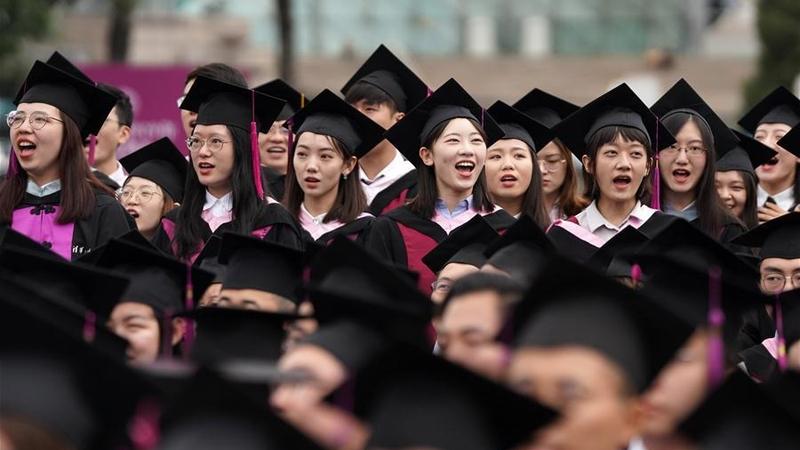 This undated photo shows Graduates attending the commencement ceremony of Tsinghua University held in Beijing. (PHOTO / XINHUA)
This undated photo shows Graduates attending the commencement ceremony of Tsinghua University held in Beijing. (PHOTO / XINHUA)
The majority of college graduates with bachelor's degrees from top universities in China chose to pursue further education last year, either at home or abroad, according to reports from various universities.
A report by Tsinghua University showed that 97.5 percent of its 3,609 senior students graduated in 2023 and were granted bachelor's degrees.
About 80.8 percent of the graduates chose to pursue further education. Among them, 2,100 students chose postgraduate studies at domestic higher education institutes, while the others went abroad.
Data from the report shows that only 15.2 percent of graduates with bachelor's degrees chose to enter the workforce, with little more than half of them recruited while the others were on flexible contracts.
Gao Kejing, a senior student from Tsinghua University's Department of Foreign Languages and Literatures, said she had been recommended to pursue further education in international journalism at the university.
Many of the college students around her prefer to pursue further education because their chances of directly finding a good job after graduation are not very good, Gao said.
She and many of her classmates have opted to compete for quotas of postgraduate recommendations or apply for programs overseas, mainly pivoting to majors other than their undergraduate majors, such as English language and literature.
"Employment prospects are an essential reference for pursuing further education. While some want academic achievements, others are seeking a higher education background," Gao said.
A number of undergraduate schoolmates who chose the path for employment may have already obtained satisfying job offers, while others have special plans for their future endeavors, such as joining an NGO, she said.
The primary choice for undergraduates at Peking University was also further education, accounting for 82.7 percent of the total, according to the university's teaching quality report for the 2022-23 academic year.
The reports from Fudan University in Shanghai indicated that it had 3,279 undergraduates in 2023, with 70 percent opting to pursue further education.
Among them, 564 students chose to study abroad and 1,714 students continued their education in domestic higher institutes. Only 18 percent of graduates chose to directly enter the workforce, the report said.
Of the 3,971 graduates at Shanghai Jiao Tong University 73 percent chose to further their studies.
As of October, 18 graduates had been employed by scientific and technological institutes of national defense or the military, while 80 landed jobs in central, western or northeastern regions.
Further education was the choice for 66 percent of undergraduates at both Zhejiang University, and Nanjing University in Jiangsu province, with the majority pursuing domestic higher education, their reports said.
College graduates with master's degrees at Nanjing University tend to seek job opportunities in Jiangsu, Guangdong, Zhejiang provinces, as well as Beijing and Shanghai, according to its report.
Ruan Jiawen, an undergraduate student at Communication University of China in Beijing, will work in the TV industry in her hometown Shanghai after graduation this year.
She is among only a small group of her classmates who have chosen to enter the workforce.
"I've received an offer, and given the current tough job market, I don't think I will be able to find a job better than this after graduating in two or three years time with a master's degree," she said.


